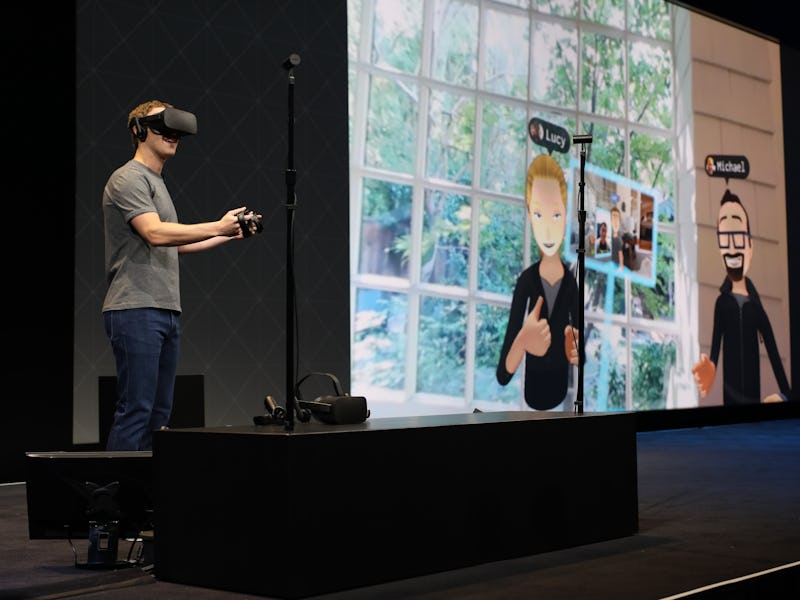The future’s going to be filled with virtual reality headsets. There’s just one problem: there aren’t many games or “experiences” available for them right now. The Call of Duty for VR hasn’t been created yet (that we know of). Facebook’s Mark Zuckerberg on Thursday announced how much the company will spend to ensure our future VR libraries are well-stocked: A half a billion dollars.
Facebook’s already spent $250 million on developed programs for its Oculus and plans to spend $250 million more.
“We’re really committed to helping this community build all kinds of different experiences,” Zuckerberg said, “From games to media and more.”
So while VR may still seem like the domain of gamers, Facebook hopes its investment will make VR diverse content platform. From allowing users to experience the same virtual reality training used by NASA to the future of filmmaking, new Oculus content promises to touch all aspects of society.
Here is where some of that $500 million in investment is going and what you can expect to see in your VR store soon:
Social-networking
Just because Facebook is doubling down on virtual reality doesn’t mean the company is abandoning interactions among people. In fact, they want to make “virtual rooms” the chatrooms of 2016.
“You can sit on your couch and hear from your best friend even if they’re a thousand miles away,” says Lauren Vegter, a product manager at Oculus VR. “This is the first time technology has made this presence possible.”
In order to further social as a “primary pillar” of its VR strategy, creating better avatars is crucial. New Oculus avatars will have a software development kit integrating touch and true hand presence in order to make things like configuring a car (also a new application of Oculus) more seamless than ever.
Seeing Locations in VR
In a Google-View-meets-Yelp approach, Oculus is partnering with Oyster to demonstrate spaces using photospheres of hotels with reviews embedded in the screen.
The new Oculus will come with a number of first-person games.
Games
Facebook wants to expand Oculus beyond games, but it’s hardly abandoning the medium.
“Oculus is developing more VR than any other game publisher on the planet,” said Ruth Bram, mobile producer, said at the event, citing the over $50 million the company has invested in mobile games so far this year.
The keynote touched on a number of new games, including Lone Echo: Ready At Dawn, which is sure to be one of the most intense VR games to date.
On the mobile side, users can expect creepy clowns, Cirque du Soleil, and virtual karaoke with friends. The keynote also hinted at play collaboration between software and mobile, which would be a first for the platform.
An artist using Quill to animate.
Art
VR isn’t just about killing aliens or playing astronauts — Oculus is being used by professional and amateur artists to tag graffiti, sculpt in real time, and animate VR films. Oculus Quill was used to animate Dear Angelica, which was demonstrated at Sundance in January. This year Oculus will also be partnering with Disney and the upcoming Blade Runner sequel to provide virtual reality content.
Social Good
Oculus’s “VR For Good” offered funding and mentorship to help ten nonprofits develop projects that leverage the technology for world-changing experiences. They also dedicated ten million dollars to programs to diversify VR.
“These are the early days and we have the opportunity to get this right,” Ebony Peay Ramirez, diversity project manager, said at the event.
Obama tries Oculus Rift.
The technology has also been expanding its educational capabilities to content like a virtual reality tour of the National Parks (which was made famous this summer when President Obama was photographed viewing the film).
Mobile Content
With over 400 applications ranging from sports streaming to using Samsung Gear VR to distract patients from their post-surgery pain, mobile VR seems even more limitless than its encumbered Oculus counterpart.
Sony is set to realize PlayStation VR, but with the impending release of a stand-alone oculus headset and new web-based VR, Oculus doesn’t seem to have any cause for concern.
Below is Thursday’s full two-hour keynote. Zuckerberg’s spending announcement, music to the ears of all the developers in the audience, comes about 24 minutes into it:
